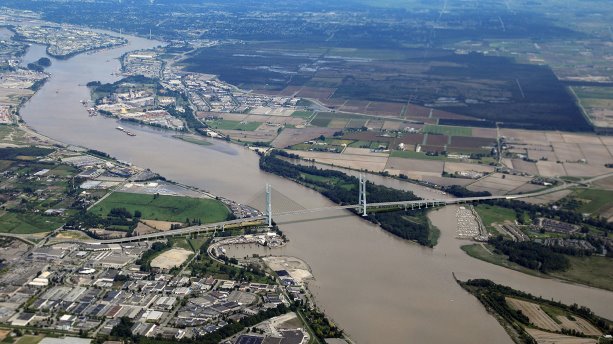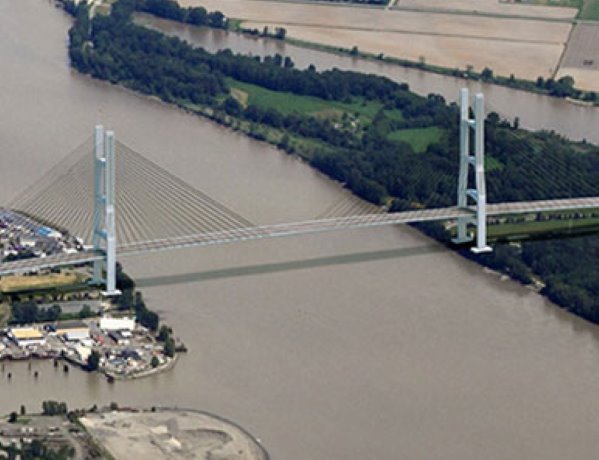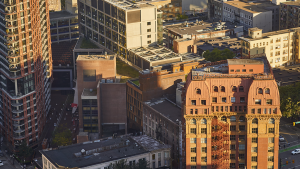Officials at Metro Vancouver are not impressed with plans to replace the Massey Tunnel with a new bridge. "History has demonstrated the world over, you can’t reduce congestion by simply building more roads," said Greg Moore, Metro Vancouver chair.
"This project represents an expansion of car-oriented infrastructure and diverts crucial funds from transportation projects that support the regional growth strategy."
Metro Vancouver acknowledged the congestion issues facing Highway 99 and the George Massey tunnel, but stated that it is unable to support the George Massey Tunnel Replacement Project as proposed based on an evaluation of potential impacts to regional assets, infrastructure and legislative responsibilities.
"We recognize the necessity to enhance the movement of people and goods on Highway 99 and throughout the region, but the magnitude of a ten-lane bridge estimated at $3.5 billion, has not been demonstrated and cannot be justified," adds Moore.
A newly released Metro Vancouver report identifies key areas of concern, including insufficient consideration of alternatives, lack of integration into the transportation network, ecological disruption, lack of consultation and impact on transit ridership and affordability.
Metro Vancouver is also concerned about the downloading of major expenditures onto local governments for road improvements
Metro Vancouver is participating in the provincial environmental review process, and has requested that the Minister of Environment and Climate Change order a federal environmental assessment review process through which Metro Vancouver and other key stakeholders would participate.
"We are genuinely concerned about the possible impacts of bridge construction, roadway improvements, tunnel removal and possible future dredging which could impact between $500-million to $1-billion in regional infrastructure and assets," said Darrell Mussatto, Metro Vancouver’s Utilities Committee chair.
Mussatto added that not only could construction disturb the area’s wildlife but the bridge would simply shift congestion elsewhere, further exacerbating the issue of single-occupancy vehicles.
Metro Vancouver also stated that it believes there was a lack of meaningful public consultation process, and incomplete information relating to project details and alternatives.
But other groups feel that Metro Vancouver doesn’t speak for the business community. The Greater Vancouver Board of Trade, Richmond Chamber of Commerce, and Delta Chamber of Commerce stated that they were disappointed to learn that Metro Vancouver is opposing the province’s plans.
"Metro Vancouver’s decision was made without consultation with the region’s business community, including our three organizations, which collectively represent thousands of local businesses," reads a press release from the Greater Vancouver Board of Trade also signed by the chambers of commerce.
"Many of these businesses are directly affected by the traffic gridlock created by the current tunnel, and have been urgently calling for a replacement that will get residents, tourists, and goods moving again."
The release explained that the Massey Tunnel is a critical link in the Highway 99 corridor, which connects the region to the U.S. Interstate highway system, the B.C. Ferries terminal in Tsawwassen, the Deltaport container terminal and Vancouver International Airport in Richmond.
The board stated that the current tunnel is nearing the end of its service life and does not meet modern seismic standards. The tunnel is also operating beyond its capacity for upwards of 13 hours each day, resulting in traffic congestion that often stretches for kilometres in each direction.
Metro Vancouver estimates the population will grow by more than one million new residents by the year 2041.
"With that in mind, we need to invest in a long-term solution that prepares us for this explosive growth over the next two decades. If we want to be a world-class region, we need to invest in world-class infrastructure," stated the board.
The chambers and the board also noted that they were involved in the four years of various phases of consultation with the province which ultimately convinced them to support the project.
"We also believe the Province has worked collaboratively with Metro Vancouver, TransLink, local municipalities, and stakeholder groups to develop the project to date," stated the board.
A 10-lane bridge would maintain the current three lanes that the counterflow provides today. It would also add one dedicated transit/HOV lane in each direction, as well as one lane in each direction for slow-moving traffic, such as trucks and merging traffic.
"We have heard loud and clear from our members, and the community more broadly, that they fully support this project," concluded the board.
"In order for our region to survive and thrive, we need to be able to move around … It’s time to move forward and replace this critical piece of aging infrastructure with the effective and well-canvassed bridge alternative already underway."

B.C. has issued an RFQ for the Massey Tunnel replacement project. The cost is estimated at $3.5 billion. Direct employment created by the project is estimated at 9,000 jobs. However, Metro Vancouver has concerns with the project.
Photo: Submitted Image"










Recent Comments
comments for this post are closed